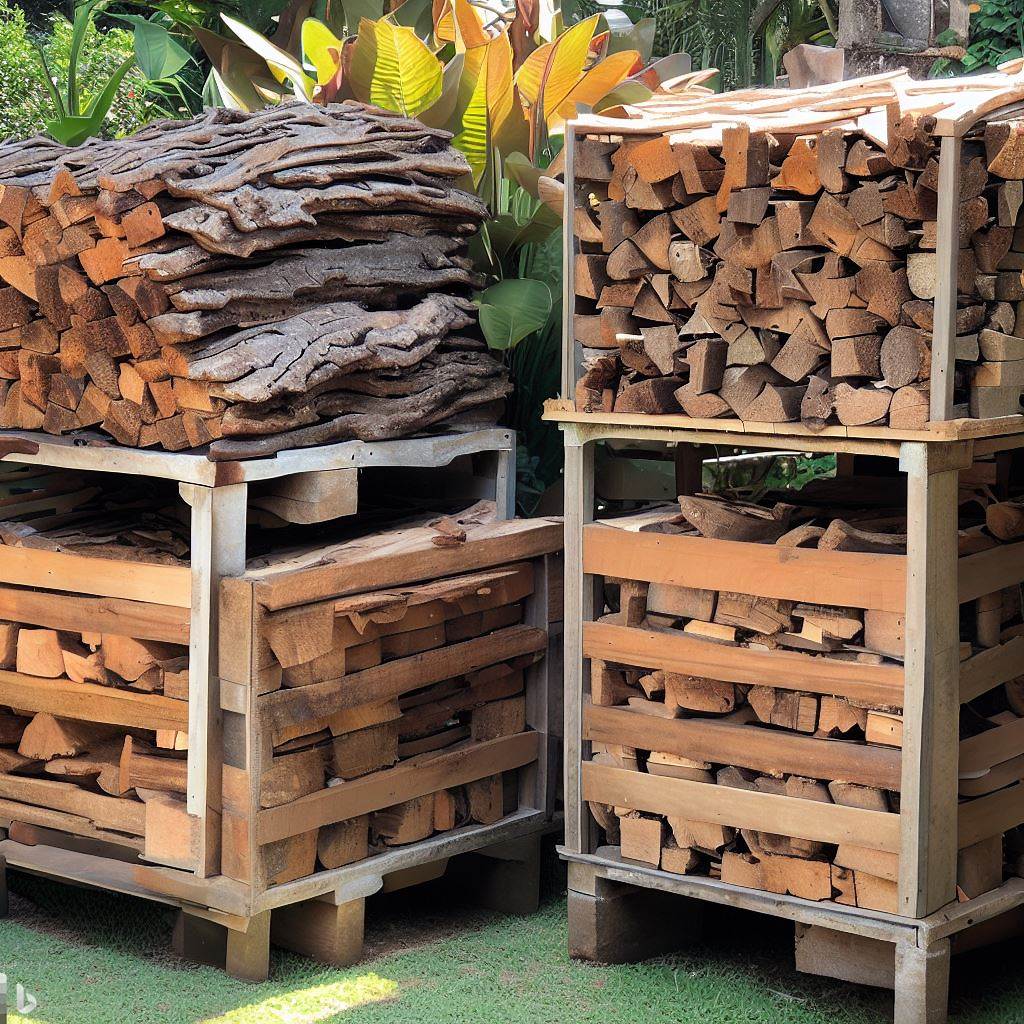From reducing carbon emissions to preserving natural resources, discover why sustainable wood is a crucial choice for a greener future. As an environmentally conscious company, Cozilogs understands the importance of sustainable practices when it comes to heating your home. In this article, we delve into the environmental benefits of using sustainable firewood logs.
Editor’s Note: 2nd December 2023 – A new detailed FAQ “Do you sell sustainable and eco-friendly firewood?” was added. 1st August 2023 – This update is from a recently written 23rd May 2023 article. Here we add a lot of extra detail, this follows the publication of our infographic exploring sustainable living in the UK.
What is sustainable wood? – A definition
Timber or wood products are obtained through responsible practices that prioritise the future health and viability of forests and sustainably deliver timber production demands. This includes sustainable forest management techniques, such as reforestation, biodiversity conservation, environmental impact mitigation, and fostering the socio-economic welfare of local communities.
There are many uses for sustainable wood including for use in building construction, cabinetry, craftsmanship, decking, fencing, wooden flooring, furniture making, landscaping features, logs for fires & heating and packaging. Using sustainable wood with natural durability ensures long-lasting and eco-friendly construction materials for various projects.
Infographic - sustainable wood eco-friendly choices for clean wood burning & sustainable heating
Cozilogs has produced an informative and comprehensive infographic on the topic of sustainable wood. The top of the infographic is shown below, this is less than 10% of its size, so it is impractical to place it all here. Simply click on the infographic to view the entire graphic in full.
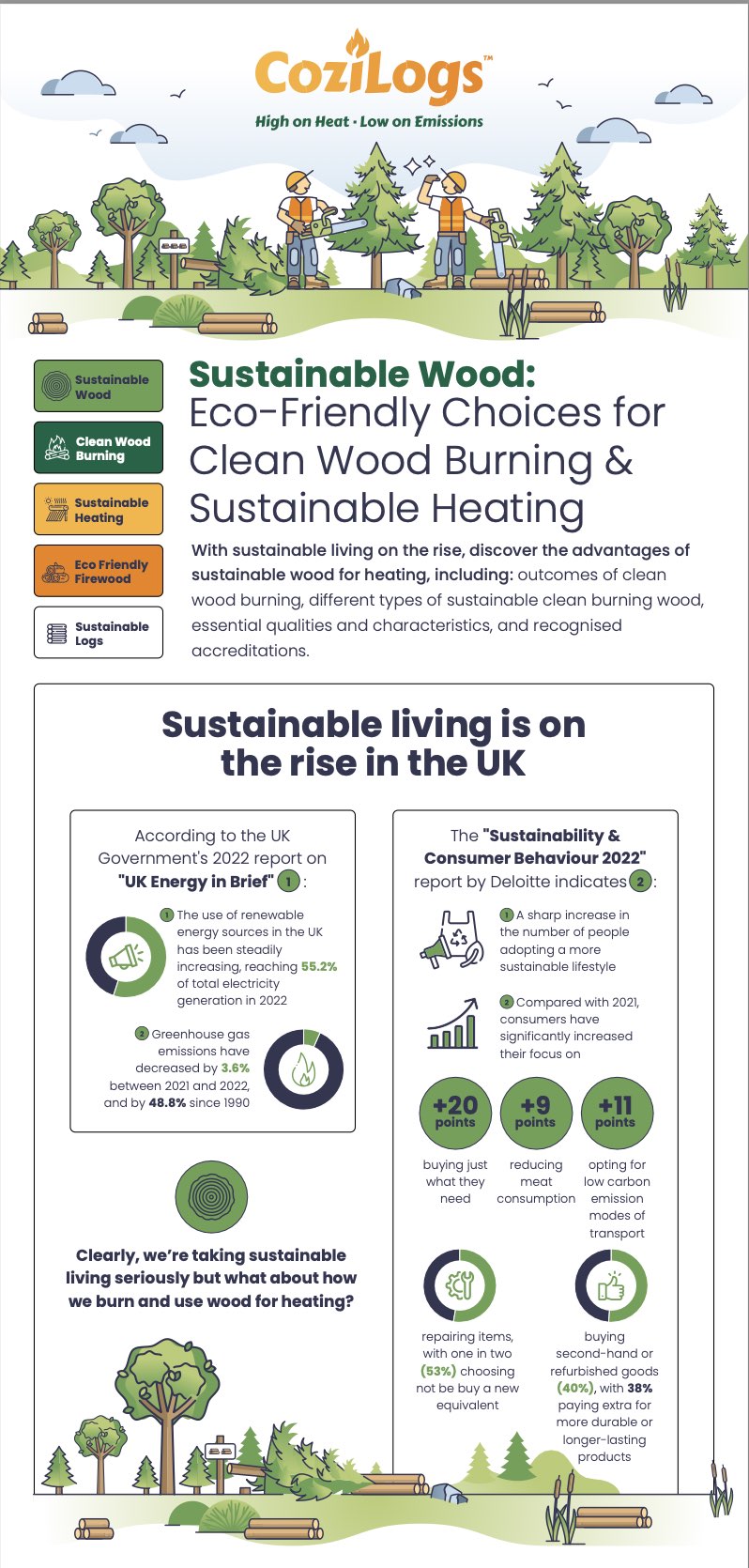
Infographic - sustainable wood eco-friendly choices for clean wood burning & sustainable heating.
Click here to view the full infographic.
Preserving Forests, protecting ecosystems: the role of sustainable wood
Embracing sustainable wood practices ensures the preservation of forests and the protection of delicate ecosystems. By using kiln-dried firewood logs sourced from responsibly managed forests (that are Forest Stewardship Council certified), you actively contribute to the sustainability of our planet. Sustainable timber harvesting practices prioritise the long-term health of forests, promoting biodiversity, soil conservation, and water quality.
When you buy sustainable wood, you play a part in preserving natural habitats and supporting the ecological balance that forests provide. Buyers do not realise the ecological harm of buying unsustainable wood. Harvested unsustainably, wood such as teak garden furniture and new mahogany flooring for its fine texture (which destroy the world’s forests) should be avoided. Shoppers could buy sustainable furniture and other alternatives (such as mango wood or straight grained black cherry for fine furniture, which is renowned for its straight grain).
What are the different types of sustainable wood that burn clean?
There are so many tree species to choose from, listed below are various types of sustainable woods that minimise air pollution, reduce particulate emissions, and contribute to a cleaner and healthier environment:
- Hardwoods – naturally sustainable hardwood tree species such as oak, mango wood, maple, birch, and ash are dense, slow-growing trees, and have a low moisture content, with clean & efficient combustion
- Fruitwoods – such as apple, black cherry, and citrus woods are known for producing clean-burning fires with pleasant aromas
- Bamboo – a fast-growing amazingly light option, bamboo grows worldwide and burns cleanly & emits minimal smoke. Buy FSC-certified bamboo for maximum environmental protection. Bamboo takes 3-5 years to harvest, which is much quicker than options like softwoods, which need 20 years or more
- Pellets and briquettes - made from compressed sawdust and other biomass. They are an environmentally friendly and clean-burning option
- Compressed logs - made from recycled wood waste or biomass. They are a clean-burning alternative to traditional firewood
By limiting annual harvests and sourcing wood from sustainable sources, we can ensure the long-term health and preservation of our forests and natural ecosystems, irrespective of what type of wood we are sourcing.
Do softwoods burn clean?
Although they do not burn as well, most softwoods are also often sustainably harvested. Softwood trees grow worldwide and include cedar, cypress, Douglas fir (and other firs), hemlock, juniper, larch, pine, redwood, and spruce. As a wood type, softwoods like pine trees tend to grow more quickly than hardwoods (broad-leafed trees) such as ash wood (a highly durable wood) and oak, this means they can be naturally sustainably farmed more often.
Carbon neutrality means improved sustainability
Sustainable firewood, such as kiln-dried logs, offers a carbon-neutral heating solution. These logs are sourced from sustainably managed forests, where forest stewards manage new tree species planting, replacing harvested trees, with more trees left, ensuring a constant carbon absorption cycle.
By using renewable resources and reducing carbon emissions associated with traditional fossil fuel-based heating methods, you can reduce your carbon footprint and actively contribute to mitigating climate change. Sustainable firewood logs provide a practical and eco-friendly energy efficient alternative that aligns to achieve a carbon-neutral future for the timber industry.
Energy efficiency and sustainable firewood Logs
Kiln-dried sustainable wood offers higher energy efficiency due to its low moisture content. During the kiln drying process, excess moisture is removed, resulting in logs with moisture levels below 20%. This low moisture content allows for a longer and more efficient burn, increasing the heat output in your home.
With reduced moisture, kiln-dried logs ignite more easily, produce less smoke, and generate a consistent and sustained heat source. By choosing sustainable firewood logs, you ensure optimal energy, reducing waste and maximising the heating efficiency of your fireplace or stove. This is particularly the case if you use efficient wood-burning appliances, such as modern clearSkies certified stoves and furnaces, that are designed to burn wood more cleanly and produce fewer emissions.
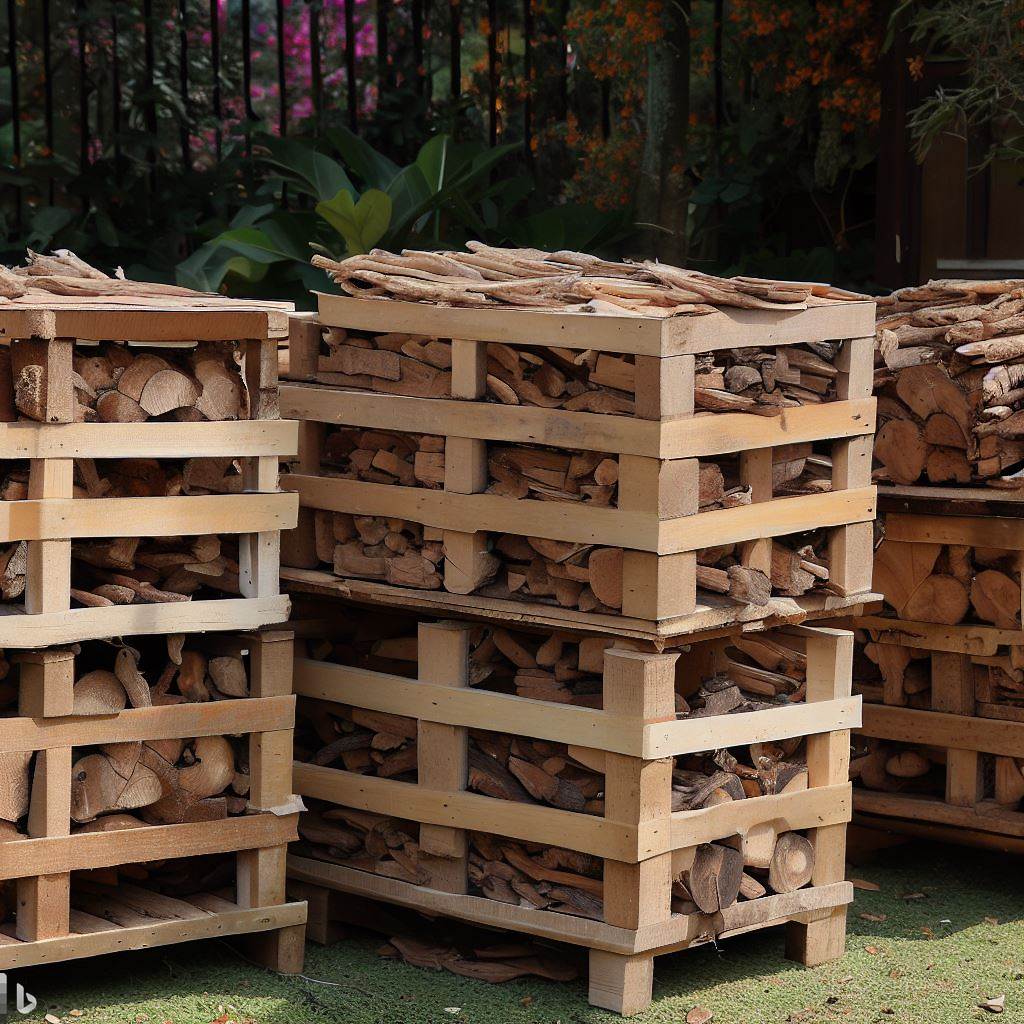
Kiln wood being air dried
Cleaner air quality
Using sustainable firewood logs promotes cleaner air quality in and around your home. Kiln-dried logs are specifically processed to have a low moisture content, resulting in cleaner and more efficient combustion. With reduced moisture, these logs produce minimal smoke, particulate matter, and pollutants, significantly reducing air pollution and health risks associated with indoor and outdoor air quality.
By opting for sustainable firewood, you create a healthier living environment for yourself and your family while lowering the impact to the environment caused by the emission of harmful pollutants.
Reduced waste and landfill impact
Through buying sustainable wood types you actively contribute to reducing waste and landfill impact. Kiln-dried firewood logs are sourced from responsibly managed forests, where every part of the tree is utilised. Wood waste and by-products from other industries are often repurposed into kiln-dried logs, wood flooring, outdoor furniture, etc., reducing unnecessary waste, and promoting circular economy practices.
Instead of ending up in landfills, these logs provide a sustainable and eco-friendly heating solution for your home. When you buy wood from sustainable sources, you support the efficient uptake of wood resources, reducing environmental pressure and waste accumulation.
Local sourcing
Choosing sustainable firewood logs means supporting local sourcing and sustainable forestry practices. Cozilogs is committed to working with suppliers who prioritise responsible forest management. By sourcing firewood logs from local forests, we reduce transportation emissions and support the local economy.
Do not support Illegal logging as this causes wholesale destruction and deforestation, which all too often occurs internationally (e.g., Siberian forests, Brazilian Amazon deforestation). This causes biodiversity loss, threatening endangered species, and environmental degradation, posing significant threats to global forests and ecosystems.
Sustainable forestry practices include selective harvesting, where only mature trees are carefully selected for logging, allowing younger trees to continue growing and maintaining forest health. By choosing to bother buying sustainable wood, you play an active role in supporting local communities, sustainable land use, and the preservation of natural habitats including more trees being planted.
Buying sustainable wood is often a complex matter, but sourcing from the UK or buying European wood is safest. It is harder to enforce standards applying to imported timber and wood sourced from Africa, Asia, North America (even the USA!), and South America. These sources of wood, typically come with fewer guarantees.
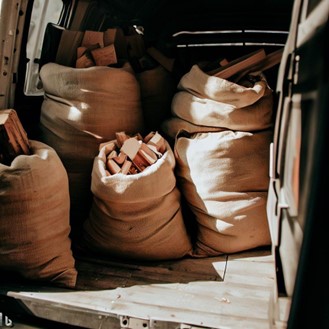
Bags of wood being delivered on a van
Renewable energy source that harnesses the power of sustainable firewood
Kiln-dried sustainable wood provides a renewable energy source for heating your home. Unlike fossil fuels, wood is a renewable resource that can be harvested sustainably and replenished. By choosing sustainably sourced firewood logs, you tap into a clean and renewable energy alternative, reducing dependence on non-renewable resources and fossil fuels.
Sustainable firewood logs align with the principles of circular economy and responsible resource management. By embracing sustainable firewood as a renewable energy source, you contribute to a more sustainable and resilient energy system, reducing greenhouse gas emissions and promoting a greener future.
The process of creating sustainable firewood logs involves the following:
- Responsibly sourced: harvested from well-managed forests, ensuring minimal impact on ecosystems. Trees are selectively harvested, ensuring that only mature and dead trees are cut down, promoting healthy forest regeneration.
- Efficient processing: meticulous seasoning and low-emission production techniques maximise resource usage and reduce environmental impact.
- Cutting and Splitting: the harvested logs are cut into manageable sizes and split into smaller pieces to facilitate better burning and efficient use.
- Drying: the logs are seasoned or dried to reduce moisture content, which improves their burning efficiency and reduces smoke emissions.
- Storing and Packaging: the dried firewood logs are stored in a well-ventilated area to maintain their quality and packaged in eco-friendly materials for distribution.
Ecological balance with biodiversity conservation
Eco-friendly firewood practices contribute to the preservation of ecological balance. The world's forest cover plays a critical role in maintaining ecological balance, supporting biodiversity, and providing essential resources for communities and wildlife.
By sourcing firewood logs from sustainably managed forests and supporting responsible forestry, we avoid illegal logging and ensure properly protected wildlife habitats and the maintenance of biodiversity. Responsible forestry practices prioritise the conservation of flora and fauna, promoting healthy ecosystems.
Firewood production considers the needs of various species, protects critical habitats, and reduces disruption to the natural environment. By choosing eco-friendly firewood, you actively support the preservation of ecological balance, the health of wildlife populations, and the overall resilience of our ecosystems.
Responsible forest management through certification and assurance
The following accreditations and regulations guarantee wood products in the UK and EU originate from a sustainable source (sustainable forests) and comply with legal requirements:
- Forest Stewardship Council (FSC) – supporting responsible forestry through FSC certified forests, you will always be able to verify a wood's sustainable source for your woodworking projects with the FSC accreditation
- Programme for the Endorsement of Forest Certification (PEFC) – plays a crucial role in promoting the future survival of our forests through its certification process. This reduces illegal logging and ensures responsible management practices and sustainable use of forest resources
- UK Woodland Assurance Standard (UKWAS) - a recognised certification system that sets the criteria and principles for assessing forests sustainable management in the UK
- Timber Trade Federation (TTF) Responsible Purchasing Policy (RPP) - aims to ensure that the planet's trees are responsibly and sustainably sourced to promote environmental protection and support the timber industry's commitment to ethical practices.
- EU Timber Regulation (EUTR) superseded by EU Deforestation-free Products (EUDR) – the EU has introduced legal measures aimed at promoting responsible sourcing of timber and ensuring the protection of EU forests
These offer consumers and businesses peace of mind, assuring them that the wood they buy has been responsibly harvested, and supports the preservation and health of forests and ecosystems:
Limiting annual harvests is an essential practice in sustainable forestry to ensure the long-term health and regeneration of forest ecosystems.
These certifications ensure that our firewood logs are sourced from sustainable forests, meeting strict environmental, social, and economic standards. With traceability and assurance, you can have peace of mind knowing that your eco-friendly firewood supports responsible forest management practices and contributes to the conservation of our precious wood resources.
Waste reduction - eco-friendly firewood as a by-product
Eco-friendly firewood production often harnesses wood by-products and waste from other industries. By repurposing these materials into kiln-dried logs, and products such as wood flooring, we reduce waste, promote efficient resource usage, and minimise environmental impacts. At Cozilogs, we are a company that cares, so we work closely with partners who employ innovative techniques to convert bought wood waste into valuable firewood logs.
This approach supports the principles of a circular economy, where sustainable material is reused and repurposed, reducing the need for raw material extraction and preventing unnecessary waste accumulation. When you identify sustainable wood, you actively participate in the waste reduction effort, supporting a more sustainable and efficient use of wood resources.
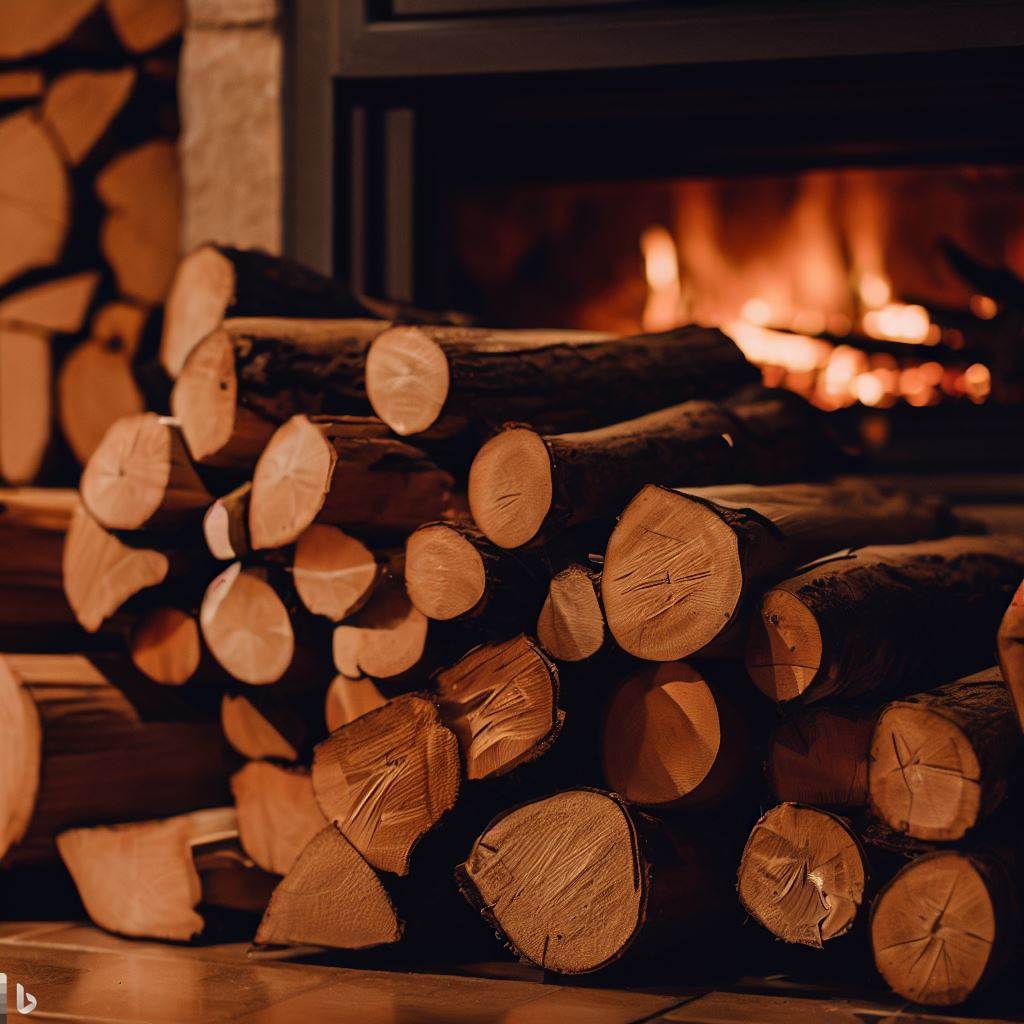
Firewood stacked by a fireplace
Sustainability and investing in a greener future
Choosing sustainable wood logs is an investment in a greener future. By embracing sustainable practices, we can ensure the availability of wood resources for generations to come. Sustainable wood production involves careful planning and responsible forest management, including carbon storage.
By prioritising sustainable heating solutions, such as environmentally friendly firewood, we reduce the pressure on non-renewable resources and contribute to a more sustainable energy system. When you buy sustainable wood, it is an investment in the well-being of our planet, supporting a greener future, and leaving a positive environmental legacy for future generations.
Environmental responsibility and your role in sustainable heating
By opting for eco-friendly firewood, you actively contribute to environmental responsibility. Cozilogs encourages homeowners to make a conscious choice in using kiln-dried firewood logs sourced from sustainably managed forests.
Your role in sustainable heating extends beyond providing warmth to your home; it becomes a personal commitment to environmental stewardship. Attempting to identify sustainable wood and use it is a small yet impactful step towards a more sustainable lifestyle, promoting a healthier environment, and ensuring a greener future for generations to come.
Advantages of using sustainable wood for heating
It is important to identify sustainable wood for these advantages:
- Accredited - (such as Forest Stewardship Council - FSC), indicates rigorous environmental, and social standards, which are managed carefully, and prevents accidentally buying endangered tree species
- Carbon-neutral - has a neutral or low carbon footprint as trees absorb carbon dioxide
- Cost-effective - competitive prices compared to other fuel options
- Cosy and comfortable ambience - adds warmth and charm
- Low waste - by utilising the entire tree, from timber to wood chips, sawdust, etc.,
- Non-toxic - there are no harmful chemicals (e.g., pesticides, preservatives, etc.,)
- Positive social impact - supports local communities, provides jobs, income, and resources
- Recyclable and biodegradable - can be recycled or left to biodegrade naturally
- Reduced non-renewables use - contributes to sustainable and resilient energy
- Renewable energy source - a continuous supply of trees is harvested and replaced
- Responsibly harvested - obtained by ethical and environmentally responsible practices, which do not damage neighbouring ecosystems
- Responsibly managed forests - ensures environmental conservation
- Use of local resources - supports local economies, reduces transport costs and imports
Outcomes of clean wood burning
Outcomes to expect include:
- Compliance with regulations - adherence to local and national regulations related to emissions and air quality standards
- Cost savings - through burning wood efficiently and effectively, clean wood burning leads to cost savings
- Energy efficiency - clean wood burning appliances and practices maximise the energy output from wood fuel
- Environmental conservation - contributes to the conservation of natural resources and ecosystems
- Improved indoor air quality - indoor settings, such as stoves and fireplaces, help maintain healthier indoor air quality
- Lowered carbon emissions - less carbon dioxide (CO2) and other greenhouse gases, mitigating climate change and extreme weather
- Reduced air pollution – keep air clean with minimised emission of pollutants such as particulate matter, volatile organic compounds (VOCs), and harmful gases
- Reduced health risks - this protects human health from respiratory issues and other health risks
- Reduced use of fossil fuels - provides an alternative to fossil fuel-based heating systems
- Sustainable resource utilisation - promotes the sustainable use of wood as a renewable energy resource
Statistics relating to sustainable wood
- According to the UK Government's 2022 report on "UK Energy in Brief" [1]:
- The use of renewable energy sources in the UK has been steadily increasing, reaching 55.2% of total electricity generation in 2022
- Greenhouse gas emissions have decreased by 3.6% between 2021 and 2022, and by 48.8% since 1990.
- The "Sustainability & Consumer Behaviour 2022" report by Deloitte indicates [2]:
- A sharp increase in the number of people adopting a more sustainable lifestyle
- Compared with 2021, consumers have significantly increased their focus on:
- buying just what they need (+20 points)
- reducing meat consumption (+9 points)
- opting for low carbon emission modes of transport (+11 point)
- repairing items, with one in two (53%) choosing not to buy a new equivalent
- buying second-hand or refurbished goods (40%), with 38% paying extra for more durable or longer-lasting products
- In the UK, the maximum amount of moisture content allowed in firewood is 20%. [3]
- The UK's total woodland area is estimated to be 3.25 million hectares [4]:
- 13% of the total land area in the UK,
- 19% in Scotland, 15% in Wales,
- 10% in England, and
- 9% in Northern Ireland
- Forests which are certified as sustainable:
- Globally, approximately 10% of forests
- UK 44% (or 44 million hectares) [4]
- This is an increase from 36% [5]
- In the UK, a total of approximately 13,000 hectares of newly established woodland were recorded during the 2022/23 period. [6]
- In the UK, a total of approximately 12,000 hectares of woodland restocking, supported by public funding, were reported during the 2022/23 period. [7]
- In a 2019 DEFRA survey [4], 19% of UK adults burned wood indoors and/or outdoors:
- the proportion burning indoors was 8%
- the proportion burning outdoors was 14%
- A contemporary Ecodesign clearSkies certified wood burning stove emits significantly lower emissions compared to:
- an open fire, with up to 90% reduction, and
- up to 80% less emissions compared to a stove that is over 10 years old [8]
Do you sell sustainable and eco-friendly firewood?
Absolutely, yes! Here is a summary of reasons why Cozilogs are proud to sell eco-friendly sustainable firewood:
- Accreditations – buy kiln dried logs and other firewood products from us and be assured that they will all be FSC certified, Woodsure Ready to Burn certified, HETAS approved and BSL Certified (Biomass Suppliers List)
- Hardwoods only – we only sell hardwoods. A variety of hardwood species are much eco-friendlier than softwoods and coniferous varieties
- Low moisture content – as discussed earlier, low moisture content is critical for eco-friendly firewood. All the firewood we sell at Cozilogs is below 20%, with some of our range below 15%
- No wet wood or green wood – you will find no wet wood or green wood in the products we sell. This aligns to kiln drying, which dries the wood ready for use. Burning wet wood or green wood is very environmentally damaging and requires much more wood for a similar amount of heat output when compared to kiln dried wood
- Responsibly sourced – our hardwood firewood is almost exclusively sourced from British sustainably managed and harvested forests and woodlands. This reduces the carbon footprint of the logs you buy from us, as they will not have needed to travel long distances to arrive at your home (some retailers sell Asian/American woods, which cost a lot to transmit)
- Virgin firewood – our hardwood products are all manufactured from virgin firewood. This means it is not recycled and will be from pollutants such as wood preservative and other chemicals you would find in old fence panels, recycled furniture, and other recycled wood, etc.
We are here to help
Whatever your question, whatever your query, you can be sure that we are here for you. From delivery to our sustainable kiln dried firewood, you can speak with us to find out all you need to know, including FSC certification! Call us on (01905) 954 736 to place your orders or if you need any further encouragement to buy wood from sustainable sources!
Sources:
- https://assets.publishing.service.gov.uk/government/uploads/system/uploads/attachment_data/file/1016838/UK_Energy_in_Brief_2022.pdf
- https://www2.deloitte.com/uk/en/pages/consumer-business/articles/sustainable-consumer.html
- https://uk-air.defra.gov.uk/assets/documents/reports/cat09/1903131256_Seasoning_Wood_Web_Feb_2019_V5.pdf
- https://www.forestresearch.gov.uk/tools-and-resources/statistics/statistics-by-topic/woodland-statistics
- https://jncc.gov.uk/our-work/ukbi-b1b-sustainable-forestry
- https://www.burnright.co.uk/wp-content/uploads/2022/02/14972_Finalreport-BurninginUKhomesandgardens-1.pdf
- https://airqualitynews.com/indoor/stove-industry-alliance-responds-to-pollution-concerns

